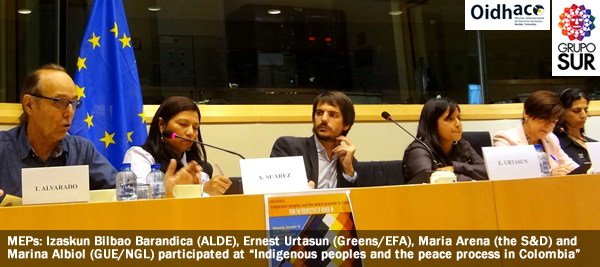Colombia’s indigenous women talked peace in Brussels last week at a European Parliament event designed to ensure the voices of women are heard in Colombia’s torturous path to peace.
The conference was held with the aim of the discussing Colombia’s current peace talks and their impact on indigenous peoples, particularly indigenous women. Organised by the civil society networks Grupo Sur and Oidhaco, and two of their members, Mundubat and Cooperacció, the meeting included the participation of European Deputies Izaskun Bilbao (ALDE), Marina Albiol (GUE), Marie Arena (S&D) and Ernest Urtasun (Greens).
“Indigenous peoples and the peace process in Colombia: a women’s perspective” This event supports the belief that “there can be no lasting peace without security and peace for women”, stated former UN Special Representative on Sexual Violence in Conflict, Margot Wallström, on her visit to Colombia in May 2012.
In the two years since the peace dialogues began, they have seen significant progress, with negotiators already reaching initial agreements on three issues: land, drugs and political participation. A gender subcommittee has also been created to include the voices of women in the agreements.
However, as Reinaldo Villalba from the José Alvear Restrepo Lawyers Collective (Colectivo de Abogados José Alvear Restrepo – CCAJAR), pointed out in the EU Parliament “Unfortunately, during this time attacks have also continued against human rights, work and conflict remains acute in many regions of the country. In this conflict, violence against women is used as a weapon of war, and it is imperative that a ceasefire is reached to put an end to this situation”.
In Colombia, more than half of the 102 existing indigenous peoples in the country are in danger of extinction due to armed conflict, and trade policies, including European policies, have made this problem worse. “The economic projects taking place in indigenous territories put pressure on our people and turn us into victims, especially women. Even the Comptroller General’s Office found that 89% of the violations indigenous peoples’ rights occur in mining and energy areas” said Aida Suarez, High Counsellor of the Indigenous Organisation of Antioquia (Organización Indígena de Antioquia).
“Our communities have been abandoned by the State and it is shocking that 75% of indigenous children suffer from chronic malnutrition; that is why indigenous women have organized and we are building our own local development and peace building proposals”, she continued.
“Although the negotiations in Havana do not guarantee us total peace, the mere fact of thinking that a ceasefire is possible, and that our territory and our bodies will no longer be a war zone, is a kind of peace for us”, reported Emilse Paz, from the Association of Indigenous Councils of Northern Cauca (Asociación de Cabildos Indígenas del Norte del Cauca – ACIN).
She also expressed deep concern about the challenges that indigenous women will face in the Colombian post-conflict phase; “International experience shows that violence against women increases in the first period of post-conflict; if justice is not ensured against these crimes and no preventive measures are taken, this is what will happen to us in Colombia”.
Meanwhile, Izaskun Bilbao, Vice President of the European Parliament delegation for relations with the Andean countries and co-convener of the event, emphasized the subject of land and victims, “two basic issues that have my support”. Bilbao also recalled that “the ultimate goal of this process is to achieve a peace based on respect for human rights, social justice and memory, which must necessarily include the reparations that the victims deserve”.
Grupo Sur and Oidhaco called on the European Union to support the ongoing peace process, but noted: “this must not be a blank cheque; we are calling for political and economic support for communities’ own local initiatives, including those put forward by women’s organisations, so that women can build peace.”
